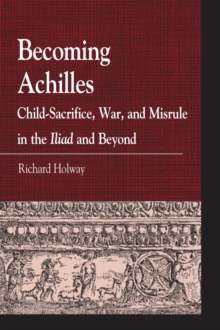Description
| Product ID: | 9780739146903 |
| Product Form: | Hardback |
| Country of Manufacture: | US |
| Series: | Greek Studies: Interdisciplinary Approaches |
| Title: | Becoming Achilles |
| Subtitle: | Child-sacrifice, War, and Misrule in the lliad and Beyond |
| Authors: | Author: Richard Kerr Holway |
| Page Count: | 270 |
| Subjects: | Literary studies: ancient, classical and medieval, Literary studies: classical, early & medieval, Literary studies: poetry and poets, Literary studies: poetry & poets, Ancient (Classical) Greek |
| Description: | Viewing the Iliad and myth through the lens of modern psychology, in Becoming Achilles: Child-Sacrifice, War, and Misrule in the Iliad and Beyond, Richard Holway shows how the epic underwrites individual and communal catharsis and denial. Sacrificial childrearing generates but also threatens agonistic, glory-seeking ancient Greek cultures. Not only aggression but knowledge of sacrificial parenting must be purged. Just as Zeus contrives to have threats to his regime play out harmlessly (to him) in the mortal realm, so the Iliad dramatizes threats to Archaic and later Greek cultures in the safe arena of poetic performance. The epic represents in displaced form destructive mother-son and father-daughter liaisons and resulting strife within and between generations. Holway calls into question the Iliad’s (and many scholars’) presentation of Achilles as a hero who speaks truth to power, learns through suffering, and exemplifies kingly virtues that Agamemnon lacks. So too the Iliad’s cathartic process, whether conceived as purging innate aggression or arriving at moral clarity. Instead, Holway argues, Achilles (and Socrates) try to prove they are not what at bottom they experience themselves to be—needy, defenseless children, who fear to acknowledge, much less speak out against, parents'' use of them to meet parents'' needs. What emerges from Holway’s analysis is not only a new reading of the Iliad, from its first word to its last, but a revised account of the family dynamics underlying ancient Greek cultures. Viewing the Iliad and myth through the lens of modern psychology, in Becoming Achilles: Child-Sacrifice, War, and Misrule in the Iliad and Beyond, Richard Holway shows how the epic underwrites individual and communal catharsis and denial. Sacrificial childrearing generates but also threatens agonistic, glory-seeking ancient Greek cultures. Not only aggression but knowledge of sacrificial parenting must be purged. Just as Zeus contrives to have threats to his regime play out harmlessly (to him) in the mortal realm, so the Iliad dramatizes threats to Archaic and later Greek cultures in the safe arena of poetic performance. The epic represents in displaced form destructive mother-son and father-daughter liaisons and resulting strife within and between generations. Holway calls into question the Iliad’s (and many scholars’) presentation of Achilles as a hero who speaks truth to power, learns through suffering, and exemplifies kingly virtues that Agamemnon lacks. So too the Iliad’s cathartic process, whether conceived as purging innate aggression or arriving at moral clarity. Instead, Holway argues, Achilles (and Socrates) try to prove they are not what at bottom they experience themselves to be—needy, defenseless children, who fear to acknowledge, much less speak out against, parents' use of them to meet parents' needs. What emerges from Holway’s analysis is not only a new reading of the Iliad, from its first word to its last, but a revised account of the family dynamics underlying ancient Greek cultures. |
| Imprint Name: | Lexington Books |
| Publisher Name: | Lexington Books |
| Country of Publication: | GB |
| Publishing Date: | 2011-11-17 |


